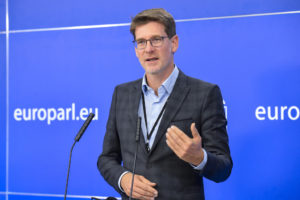
Taxonomy: with nuclear and gas is it still so green?
At present, these purely beneficial activities for the climate represent less than 5% of the activity of European companies whose model is very marginally oriented towards compliance with the Paris Agreement. The taxonomy was supposed to speak of the future, but Member States wanted to inject gas and nuclear power into it. In the first case, eastern countries like Poland, which consume a lot of coal, hope to be able to finance their transition from coal to gas, an energy still fossil but emitting less CO2. In the second case, it responds to a desire of France and its president to see nuclear energy labeled transition energy to be able to finance the construction sites of new EPRs and the renovation of existing plants, which should cost 150 billion euros. minimum, with European money.
Pascal Canfin, the president of the Environment Commission of the European Parliament, wanted to remain optimistic at the end of 2021 explaining that the political compromise can avoid the paralysis of the whole system.
Does sustainable finance prioritize finance or sustainability?
The document, sent to member states on December 31, 2021, sets out the criteria for classifying as “sustainable” investments in nuclear or gas-fired power plants for the production of electricity. A compromise that goes in the direction of French interests.
The objective of this taxonomy is to direct private and institutional funding towards activities contributing to the reduction of greenhouse gases.
Text requested by France
The conditions for the inclusion of nuclear power and gas in European taxonomy, the two energy sources being found in the same legal category, even if nuclear power is nowhere formally qualified as a “transition” energy according to the French executive, unlike gas.
Finally, Brussels will require guarantees in terms of the treatment of nuclear waste and the dismantling of installations, consistent with existing treaties.
Unattainable threshold for gas
As for gas, qualified as transitional energy, strict CO2 emission standards will be put in place.
In addition, a transparency criterion is also introduced for gas and nuclear: investors will have to specify what is the corresponding share of these energies in their financial products respecting the green taxonomy.
Financing new reactors
France, which wants to relaunch its nuclear industry – a stable and carbon-free source of electricity – has long defended the inclusion of the atom in European taxonomy.
The French energy company, EDF, has reason to be happy: the conditions announced by Brussels should make it possible to obtain green financing both for the continuation of the major refit and the construction of new nuclear reactors (including for export), such as the wishes Emmanuel Macron.
Reduce financing costs
Other central European countries, such as Poland or the Czech Republic, had also pleaded for such a text. It must be said that they must replace their very polluting coal plants. Including nuclear power in this classification will reduce financing costs, which is crucial for the projects concerned.
Germany shuts down its last nuclear reactors
Germany has expressed its opposition to the project on qualifying nuclear as green energy, recalling that its position on this point remains “unchanged, the government remains convinced that nuclear energy cannot be qualified as sustainable”.
“By introducing the flexibilities necessary to find the conditions for a political agreement, without harming the environmental transition, the Commission has resolved the squaring of the circle”, welcomes French MEP Pascal Canfin (Renew), chairman of the environment committee, who believes that a majority will emerge in Parliament to validate the text.
Pascal Canfin invites you not to be mistaken. “Ecology fits fully into the three axes mentioned by Emmanuel Macron,” he assures. When we talk about “power”, the stake is for the EU to set our own rules of the game in globalization to weigh against China and the United States, continues the MEP. This is precisely what the Border Carbon Adjustment Mechanism (MACF) one of the fourteen “fit for 55” measures and is nothing more or less than the introduction of a carbon tax at the borders of the 27. The stakes are threefold. The EU’s climate and environmental efforts can already be prevented from undermining the competitiveness of its companies vis-à-vis those which export their goods and services to European markets. It is also a matter of avoiding the relocation of industrial activities to corners of the globe where production conditions are less restrictive, especially at the environmental level. Finally, it is to encourage the rest of the world to increase their climate demands.
“We will not be able to get the 27 to adopt the whole ‘fit for 55’ within six months, it’s too heavy,” said Pascal Canfin. Especially since this package of fourteen measures is not the only environmental issue, at the moment, on the European agenda. In mid-November 2021, Brussels published a bill aimed at prohibiting the importation into the European market of products or raw materials which contribute, in one way or another, to deforestation or the destruction of natural environments in tropical regions. On this text too, with its high stakes, the 27 member states still have to agree on a version that is as ambitious as possible. “Here again, the objective is to achieve this under the French presidency,” said the MEP.

















